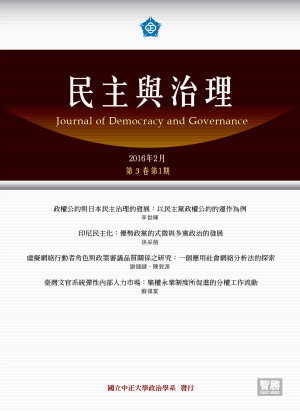Hot News
| 中文篇名 |
印尼民主化:優勢政黨的式微與多黨政治的發展 免費試閱 | |
|---|---|---|
| 英文篇名 |
Democratization of Indonesia: Decline of Golkar and the Development of Party Politics | |
| 作者 | ||
| 中文摘要 |
印尼自1998 年蘇哈托下台後開始邁向民主化,迄今已是東南亞11 國中民主指數最高的國家。在印尼民主化過程中,一個很有趣的現象就是在蘇哈托時代便確立實質「優勢政黨」地位、組織與勢力並深入印尼社會各層面的戈爾卡,卻在1999 年「後蘇哈托時期」的第一次奠基型國會大選中,即喪失優勢政黨的地位。而自1999 年以降,印尼所舉行的諸屆國會與總統大選,基本上呈現多黨競爭而無一黨能持續掌握有效多數的態勢。本研究旨在探討造成戈爾卡黨式微與多黨政治發展的制度性與非制度性因素,而認為印尼政治菁英的權力分享文化、伊斯蘭政黨的務實與高度妥協性、比例代表制的國會選舉制度、與國會政黨掛鉤的總統提名方式,以及選舉相關法規對政黨參選的限制,雖然使得戈爾卡黨喪失操控政局的能力與阻礙民主化進程的可能,卻也同時無法促使中大型政黨進一步整合、提升菁英的政黨忠誠度與抑制個人型政黨的崛起。如今印尼的多黨政治體系雖趨於鞏固,國會政黨碎片化所導致的效率不彰及眾政黨普遍缺乏制度化,則是該國未來欲提升其民主品質的兩大障礙。 | |
| 英文摘要 |
The democratization process in Indonesia has been progressing steadily since the fall of Suharto in 1998. Unlike many other dominant parties in Asian countries which have endured in power for several generations even after the practices of free elections, Golkar—the long- time “ruling party” during the whole Suharto period—lost its dominant position in politics immediately after the first-time election of the new reformasi (reform) era. From 1999 onwards, the democratic transition of Indonesia has mainly developed through competitions and negotiations among quite a few political parties, in which no single party can control the whole situation effectively. From the parliamentary and presidential elections in the past 15 years, this paper tries to highlight some institutional as well as non-institutional factors which contribute to the decline of Golkar and the development of multi-party system in the current Indonesian politics. | |
| 關鍵詞 |
戈爾卡黨、印尼、民主化、優勢政黨、Golkar、Indonesia、democratization、dominant party | |
| 刊名 | ||
| 期數 | ||
| 起訖頁 |
031-061 | |
| 出版單位 |
國立中正大學政治學系 | |
| DOI | ||
| QRCode |
| |
| 上一篇 | ||
| 下一篇 |



